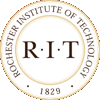4005-759-01: Pattern Recognition (RIT CS, 20092)
Home
---
MyCourses
---
Syllabus
---
Slides and Notes
---
Assignments
---
PRTools Examples
---
Resources
Instructor: Richard Zanibbi, Office: 70-3551 (Golisano College)
Office hours: 2-3pm Tues. and Thurs., 10am-12pm on Wednesdays
Lectures: 4-5:50pm Tuesdays and Thursdays, Room 70-3445 (Golisano College)
Syllabus
Calendar Description
An introduction to pattern classification and structural pattern recognition. Topics include: feature extraction, Bayesian decision theory, nearest-neighbor rules, clustering, support vector machines, neural networks, classifier combination, and syntactic pattern recognition techniques such as stochastic context-free grammars. The course is part lecture and part seminar: students will present some course material to the class as well as complete and present a research paper. In addition, programming assignments will provide students with practical experience in constructing pattern recognition systems such as optical character recognizers (OCR). Class hours: 4, Credit: 4
Prerequisites
4003-455 (Artificial Intelligence) or 4005-750 (Introduction to Artificial Intelligence), or Permission of the instructor.
Course Outcomes
At the end of this course, students will be able to:
- Explain and compare a variety of pattern classification, structural pattern recognition, and pattern classifier combination techniques.
- Summarize, analyze, and relate research in the pattern recognition area verbally and in writing.
- Apply performance evaluation methods for pattern recognition, and critique comparisons of techniques made in the research literature.
- Apply pattern recognition techniques to real-world problems such as document analysis and recognition.
- Implement simple pattern classifiers, classifier combinations, and structural pattern recognizers.
Textbook and Readings
Course Web Page: http://www.cs.rit.edu/~rlaz/20092/
Recommended Text: Combining Pattern Classifiers: Methods and Algorithms, by Lumila I. Kuncheva, Wiley 2004 [ Web Page ]
We will be working from multiple sources this quarter, and a number of readings will be posted on the MyCourses page for the course. Our sources will include research papers, books (some available from the Wallace Library) and others. A list of books on pattern recognition and academic writing for Computer Science are provided online here: http://www.cs.rit.edu/~rlaz/prec20092/Resources.html.
Help with Mathematics
Though this course is largely a survey/overview course, there is a significant amount of mathematical content. If you find that you are challenged by
notation or mathematical concepts used in the course, please make use of the
instructor's office hours, or email the instructor to set up an appointment.
If after consulting the instructor you feel that you still need additional help, you
are encouraged to make use of the RIT Academic Support Center, which has a drop-in center and a number of other useful resources.
Grading
Students will be evaluated based on (roughly 2-3) in-class group presentations of course material, a course project (completed in teams), a research paper (completed individually: includes an outline, rough draft, final version, and presentation), and midterm and final examinations.
| 20% | One Seminar presentation (50 mins)
|
| 5% | Seminar evaluations
|
| 30% | Project (Final report and presentation: 25%, Proposal: 5%)
|
| 30% | Research Paper (Final paper: 25%, Proposal: 5%)
|
| 15% | Midterm Examination
|
Tentative Schedule
Please note that this schedule may change over the course of the quarter: look under the "Schedule & Slides" page on the course web pages for the current schedule. Note: Students will present material on Tuesday of Weeks 6 through 9.
| Week | Topics | Assignments and Exams
| 1 | Overview, Classifier Evaluation, Bayes' Decision Theory |
| | 2 | Linear and k-Nearest Neighbor Classifiers | Thurs: Paper Proposals due
| | 3 | Tree Classifiers and Neural Networks | Thurs: Project proposals due
| | 4 | Support Vector Machines |
| | 5 | (Midterm Week) Classifier Combination | Tues: Midterm (2 hrs)
| | 6 | Classifier Combination, Continued |
| | 7 | Feature Selection | Thurs: Last day to submit paper draft
| | 8 | Clustering |
| | 9 | Structural and Syntactic Pattern Recognition |
| | 10 | Project and Research Paper Presentations | Thurs: Final project reports and papers due
| | 11 | (Exam week) | Final Examination (2 hrs)
| |
Late Policy and Examination Rescheduling
Late submissions are penalized 10% (1 letter grade) per day, for up to two days. After two days, late submissions will not be accepted.
Exams will only be rescheduled in the case of difficult situations for which
there is formal documentation (e.g. a doctor's note). Contact the instructor as
soon as possible if you encounter scheduling or other issues regarding the
exams.
Academic Integrity, Citation, and Plagiarism
Students may discuss assignments and projects with others,
but submitted work (papers and code) must be created independently by each
student or group, and not copied from another student or other source.
All borrowed ideas, text, or code used in papers and assignments must be cited appropriately.
Citations must be provided using an accepted format for academic journals in
computer science (e.g. ACM or IEEE styles). Providing only a URL for a references is unacceptable: in the case where a
URL is appropriate (e.g. for software), the author, title, and date for the
document associated with the link must be provided with the citation.
In cases where it appears that copying of material or plagiarism has occurred, the Department of Computer Science Policy on Academic Integrity
will be followed.
